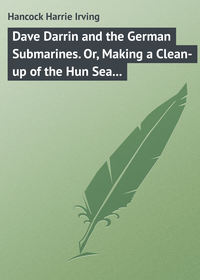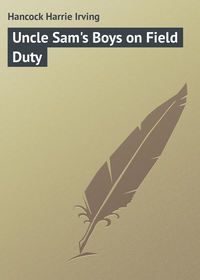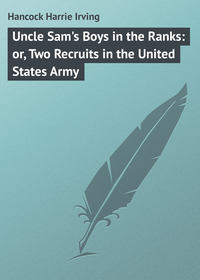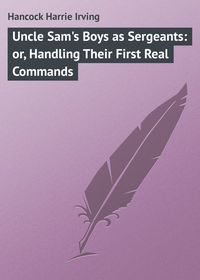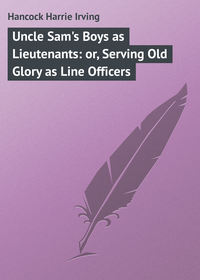 полная версия
полная версияDave Darrin on the Asiatic Station. Or, Winning Lieutenants' Commissions on the Admiral's Flagship
“If I am making you uneasy, then I shall go down at once,” answered the missionary simply. “My friend, may you be fortunate and successful here to-day!”
He held out a hand which Ensign Darrin grasped. Then the old man started below.
“The Chinese are starting firing from the river side,” Dave announced, as a heavy volley of shots rang out from a new point. “Dan, you had better go over and direct our reply to the fire from the river side. Don’t let any of the yellow rascals get close to the compound.”
Dave turned just in time to see Sin Foo crawling down the steps, while “Burnt-face” looked on with evident interest.
“Mr. Sin Foo,” Dave rasped out sharply, “come back! If you make another attempt to leave this rampart you will be fired upon without challenge. Any of my men who see you make the attempt will shoot you without further orders.”
His fright showing to a ghastly degree, Sin Foo slowly crawled back. He was not in the slightest danger so long as he did not raise his head above the parapet, but the under secretary plainly had no military blood in his veins.
As for the Chinese soldiers on the ramparts, none of them displayed curiosity, nor had they shown any intention of attacking the Americans. It looked as though these yellow fighting men of the governor’s did not regard it as being in any way their fight. Several of them were smoking pipes that gave off villainous odors.
Leaving a petty officer in charge, with general instructions, Dave went over to Dan’s side of the compound.
“Your husband is showing magnificent courage,” remarked Bishop Whitlock to Mrs. Darrin.
“My husband has been trained in the greatest fighting school in the world,” Belle answered, “and I am certain that he is conducting himself according to the best traditions of his training and service.”
A sailor came nimbly down with a message from Dave to the marines to open some of the food supplies and to start the preparation of a meal. In case the ladies were ready to eat, the marines were instructed to serve them first.
“How long since you Navy men have eaten?” Belle asked the sailor.
“Supper-time, last night, ma’am,” replied the sailor, grinning.
“Then we women cannot think of eating until you men are taken care of,” Belle replied, with emphasis.
“Not one of our men would eat until the ladies have eaten, ma’am,” replied the sailor respectfully. “Ask that sea-going soldier there.”
“When there are ladies with our parties, ma’am, they always have to be looked after first, ma’am,” said the marine, straightening up.
“There are enough women here to serve every one at the same time,” replied Belle Darrin. “Ladies, come here and help, if you please.”
There were only crude implements with which to prepare food, but a supply of wood was brought and preparations for a meal went rapidly forward.
With only sixty-eight riflemen to guard all four sides of the yamen, and twenty of these civilians, Dave’s task of defense was not an easy one.
At times spurts of rifle fire swept the ramparts, though so far none of the rebels had attempted to rush the yamen.
“Remember, men,” Dave urged, as he passed along behind the firing parties, “your great task is to keep the heathen from rushing us. Make every cartridge count, but don’t expose yourselves unnecessarily so long as the enemy are content to keep close to cover. Unless they succeed in making numerous hits, I don’t believe they will try to rush us in daylight.”
“But to-night, sir?” spoke up one of the petty officers.
“I hope that we shall have a chance to get out of here before nightfall,” Ensign Darrin answered.
“It will be a miracle, if we do get out of here safely before nightfall,” muttered the same petty officer, as Dave passed on to another part of the defenses.
After a while the firing died down. Dave ordered strict watch kept, but directed that there be no unnecessary firing until the Chinese beyond opened up heavily again.
Then, in the lull, he descended to the compound, to see to the care of the women, and afterwards of the men.
Standing aside, talking with a group of women, was Pembroke. That young man had made no effort to secure a rifle; he had not even offered his services toward the defense.
At the first opportunity Darrin walked aside with his wife.
“Mr. Pembroke came up from Manila with you?” he asked.
“On the same ship, yes,” replied Belle.
“And came up on the same river boat with you?”
“Yes.”
“Did Pembroke go to the mission to live?”
“He was there a part of the time,” replied Belle. “He also lived elsewhere in Nu-ping some of the time. One day, I remember, I saw him on the street with a Chinaman who had a peculiar purple mark on his face under the right eye.”
“Did you know that that same Chinaman, with the purple mark, is here at the yamen now?” Dave asked.
“Why, yes; after we were shut up in the building at the back of the compound, this morning, Mr. Pembroke went outside for a while, and afterwards I saw him talking with that same Chinaman with the purple mark on his face. Why are you asking all these questions, Dave?”
“Because I am puzzled about Pembroke,” Dave replied. “At Manila I had an intimation that Pembroke is far from being a gentleman. At Manila, too, ‘Burnt-face’ was in evidence; if he were in Manila now he would be arrested, charged with the murder of another Chinaman. I have been doing some hard thinking, Belle. Suppose Pembroke knew that trouble with rebels was about to break out here at Nu-ping? He did know that the ‘Castoga’ was the gunboat in eastern waters best fitted for ascending the Nung-kiang River and that she was going there. Pembroke tried hard to make my acquaintance and to force himself upon me. Did he figure on being able to use me to advantage when the ‘Castoga’ was ordered to duty at this port, where he may have known that the rebellion was about to be sprung? To go further, were and are Pembroke and ‘Burnt-face’ pals and comrades, working together for some sinister purpose?”
Belle looked puzzled as she replied slowly:
“Bishop Whitlock attributes the present trouble to the spreading of a foolish story that in the mission grounds were buried millions of dollars’ worth of treasure, looted from an ancient Chinese temple. What connection could Pembroke and his Chinese friend, away down in Manila, possibly have with such a stupid fable as that?”
“They may have believed the story,” Dave answered, “and so may the governor of this province, who is skulking in yonder building. The governor and his followers may have secretly fomented this rebellion, in order to have a chance to loot the mission and secure, as they thought, the buried treasure which we know doesn’t exist. And the governor, knowing how quick Uncle Sam would be to send a gunboat here, may have sent ‘Burnt-face’ to Manila to find some white rascal who could get acquainted on board the ‘Castoga,’ and perhaps thwart our plans. Pembroke may be here, even now, for the purpose of springing some treachery.”
“That is an awful thought, Dave!” cried his wife.
“But it may be pretty close to the correct guess,” Ensign Darrin rejoined. “At any rate, I shall have a pretty close watch kept on the movements of Mr. Pembroke!”
CHAPTER VIII – THE SWARM OF NIGHT FURIES
Late in the afternoon another meal was prepared.
Though the yamen was surrounded on all sides, and “sniping” was engaged in from time to time, the Chinese besiegers made no attempt to rush the compound.
Toward the end of the afternoon Dave carried on some vigorous signal talk with his commanding officer aboard the “Castoga.”
“It does not look safe for you to risk bringing party through to river,” came the message from the gunboat. “Do you think you can hold the yamen through the night?”
“Think I can hold yamen through the night,” Dave signaled back, “if you sanction my using extreme measures at need. I may have to put the Chinese soldiers on the other side of the gate before dark comes on.”
“Do so, if absolutely necessary,” came the part approval. “If you wish, I will try to get thirty more men through to you. Cannot spare more without crippling ship.”
“I believe so small a force as thirty men would be massacred in the streets before reaching here,” Dave signaled back. “Would advise against your trying to send small reinforcements.”
“Am trying by wireless,” signaled the gunboat, “to pick up other naval vessel along the coast. If I establish such communication, will endeavor to have at least one hundred additional men sent up, even if they have to ascend river in motor launches. Think, if you can hold on until to-morrow, I can send substantial reinforcements.”
“Will hold out through the night, if we have to keep shooting every minute,” Darrin signaled his commanding officer.
“Have you plenty of ammunition?” came the query.
“Yes,” Dick signaled back. “Have been firing cautiously.”
Just before dark came on the gunboat signaled:
“Good luck through the night.”
“Thank you,” Ensign Dave caused to be signaled back.
After a conference with Dan and Bishop Whitlock, Dave decided upon bold measures. Toward every party of Chinese soldiers, on the ramparts or in the compound, went, all at once, small parties of sailors. In a twinkling, and almost without protest, the sailors seized the rifles of the yellow soldiery.
“Form the governor’s troops in the compound,” was the order that Darrin suddenly bawled forth.
“What are you about to do?” demanded Sin Foo, from the rampart.
“We are about to gag you, Mr. Sin Foo, if you open your mouth again,” came the young ensign’s stern answer.
Quickly the native troops were formed below. Dan, in the meantime, massed a strong force and two machine guns on the rampart over the main gate. At a signal the gates were thrown open. The blinking, unresponsive yellow soldiers were driven forth, and the gate shut fast on them. Dan’s precautions overhead had been taken in case the armed multitude beyond should attempt a rush when the gate was opened. But Dave put through the whole maneuver successfully.
Leaving a guard of only seven men on a side, and massing his fifty-six other fighting men, Dave marched up to the governor’s yamen.
“The move that I am going to take may bring down a torrent of official abuse upon my head,” thought the young ensign.
First he called out a summons to open the door of the governor’s dwelling. There being no answer, he directed several sailors, with a pole on their shoulders, as a battering ram, to smash in the door. Once the door was down, Dave led his party inside, and began searching from room to room.
At last he came upon the governor, surrounded by the same score of soldiers. In addition were “Burnt-face” and some dozen attendants.
“Disarm the soldiers,” came Darrin’s instant order, as he marched his command into the spacious, handsome, richly furnished room in which the governor had taken refuge. “Do it without fuss, if you can, but take the guns away.”
Three of the soldiers attempted to resist, and were promptly knocked down by the sailors; after that, all submitted to disarming.
“March these yellow soldiers outside and give them the gate,” smiled Ensign Dave. “Leave ‘Burnt-face’ and this servant with the governor, and put the rest of the attendants outside too. Forward, march!”
That audacious move was carried out without a hitch.
“Pass the word for Mr. Sin Foo,” Dave ordered. Then, when the indignant under secretary appeared, Dave went on:
“Mr. Sin Foo, kindly assure his excellency that we have acted in the only way possible, and that we mean no harm to him, unless he should make such action necessary. Tell the governor that we have put his people outside because we do not intend to have any nonsense here to-night.”
Sin Foo started to speak.
“Pardon me, Mr. Darrin,” interposed a missionary, “but the under secretary is not interpreting correctly. He is abusing you to the governor.”
“Look here, my friend,” warned Dave, placing a heavy hand on Sin Foo’s shoulder, “either you play fairly, or you will find yourself in more trouble than one poor under secretary can be expected to handle easily. Tell his excellency just what I said.”
Governor Tai-pu listened in silence. Nor did he offer any comment when Sin Foo had ceased speaking.
“Does his excellency understand?” Dave asked.
“He does,” replied Sin Foo.
“Yes,” nodded the missionary who had interposed.
“His excellency will be required to remain in the open with us to-night,” Darrin continued. “We must have him where we can easily keep both eyes on him.”
“I beg your pardon, Mr. Darrin,” said one of the missionaries, approaching. “Do you think it will be prudent to have lights in the compound to-night?”
“It will be much better to have them,” Dave replied, “provided that no glow from them is reflected toward the ramparts. Any light behind our men, that showed them more distinctly to the enemy, would imperil our safety. But lights in one point at least in the grounds would be advantageous, as such illumination would tend to make the women less afraid. It’s human nature, you know, sir, to be more afraid in the dark, and we must give every possible thought to the feelings of the women on such a trying night as I fear this is going to be.”
Thanking him, the missionary hurried away, beckoning to three other men to follow him. These soon returned, bearing armfuls of Chinese paper lanterns. Cords were tied from tree to tree in the center of the compound, and from these lighted paper lanterns were soon dangling. In and out of the lighted area passed the women and other non-combatants, strolling about.
“That looks like a glimpse out of a pretty picture,” said Dave, to his brother officer, as the two stood on the river side of the ramparts.
“Especially with the glow that the lanterns cast on a background of picturesque Chinese buildings,” Danny Grin agreed. Then he turned to gaze into the darkness beyond, adding:
“David, little giant, we shall have very little to do with pretty pictures to-night. The nightmares of war will claim the greater part of our attention.”
One group of women there was that did not appear. They comprised the women of the governor’s family, who, with the children of the yamen, had taken refuge in one of the larger buildings. They were not required to come out into the open.
“Sir, I think I see figures advancing,” whispered a sailor, gliding up to Ensign Darrin.
In an instant Dave threw up his night glass.
“You’re right,” he answered, in a low tone. “Pass the word to the men at the machine gun to be ready.”
Stepping quickly down the little line on the river side of the wall Dave gave whispered instructions to the men to lie low and to await the order to fire.
Then, motionless as a tree, Darrin stood for fully two minutes, with the glass at his eyes.
“Ready!” he called, at last, in a low, but penetrating voice. “Aim! Fire!”
As the volley crashed out, Danny Grin raced around to the west rampart, to look for signs of a Chinese advance against that side.
Hundreds of Mongols had stolen forward on the river side. Instead of checking these, the brisk American fire brought thousands of others swarming from the streets and buildings.
“Keep that machine gun going,” shouted Darrin in the ear of the machine gun captain. “Make it hot, my men! We want to get as many of the yellow fiends this time as possible. The more bloody they find this charge the more careful they will be through the rest of the night.”
To add to the din Danny Grin had ordered the machine gun on the west side to fire, directing also his riflemen to fire only as sharpshooters.
Rightly judging that the attack on two sides might be only a feint to draw attention away from the biggest movement of all on the southern side, Darrin darted around to that point, traveling on the rampart.
Nor had he been there two minutes before the howls of thousands of infuriated yellow men sounded on the open ground before the wall.
“Pump that machine gun,” Dave ordered sharply to the men at the gun. “Riflemen! Fire at will, and shoot as straight as you know how!”
This latter order he repeated as he darted along the line.
“Here, my friend, you get down! Lie behind the parapet; don’t expose yourself in that fashion,” Dave ordered, pushing down a sailor who had knelt on the parapet instead of lying behind it.
“I wanted to get a better aim, sir,” replied the young sailorman, upturning a face full of enthusiasm.
“And you want to show your sand, too,” nodded Dave appreciatively. “None doubts your courage, my man, but the fighting man who exposes himself needlessly draws just that much more fire toward comrades close to him. Remember that, and keep down.”
Plunk! plunk! Dave was just in time to see the tops of two ladders planted against the stone ramparts by yellow men under the walls.
“Look out, men!” he yelled. “The Chinks are trying to plant ladders and scale the walls! Beat ’em back, or we are gone!”
A yellow face appeared at the top of one of the ladders. Like a flash Ensign Darrin bounded forward, bringing down his sword on the left shoulder of the yellow man.
Then, without a moment’s further thought, Darrin seized the top of the ladder, giving it a mighty push that sent it toppling to the ground below. In a moment he had sent the second ladder, with three men on its rungs, after the first.
Drawing his revolver, and throwing himself across the parapet, Ensign Dave emptied ten shots into a mass of yellow humanity at the foot of the wall. Some of the sailors followed his example.
But now it seemed as though nothing would daunt the desperate, rat-like courage of the Mongols.
All along the four sides of the rampart, light bamboo ladders were set up. Hundreds of yellow assailants rushed up these ladders.
“Prepare to repel boarders!” lustily howled one sailorman, as he sprang forward, clubbing three Chinese in succession over the head.
But it looked as if the American force must be overwhelmed, for with fiendish fury the yellow swarms toiled up and fought at the edge of the parapets.
CHAPTER IX – THE TRAITOR OF THE YAMEN
How they ever came through the next fifteen minutes was afterwards a mystery to Dave and Dan.
They were in the thick of that frantic, deadly scramble for possession of the ramparts. As fast as Chinese assailants fell they were instantly replaced by others.
When Dave’s revolver was not barking, his sword was in action, and his arms fairly ached with the labor of pushing away ladder after ladder. Hardly one of Dave’s men was less occupied. Many of the Chinese had dropped the rifle for the long spear, or else for the keen, two-edged sword. American blood flowed in that quarter of an hour.
Boom! Out of the darkness came a trail of fire. Bang! A shell from the “Castoga” exploded among the nearest buildings on the river side beyond the yamen compound. In another moment flames were leaping upward from a flimsy house in which a shell had exploded.
Boom! Other shells began dropping about, on three sides of the compound. Soon a score of native houses were in flames, the light showing to the marksmen on the parapets just where to “find” their yellow assailants.
But no shell was fired over the yamen. Plainly the “Castoga’s” gunners feared that they might drop a shell into the compound itself.
On three sides the flames of the conflagration made the surroundings nearly as bright as in daytime. The men on the ramparts could now see excellently, and aim accordingly.
At the same time the attack by ladders ceased, for now the laddermen were too plainly visible and could be killed with ease.
“Great work, that done by the shells!” chuckled Danny Grin.
“Yes,” nodded Dave, “but I wish we could have the same kind of illumination to the southward. Withdraw enough men from the other three sides, Dan, to strengthen the southern rampart sufficiently.”
The machine guns barking out anew, and with increased deadliness, the thousands of fanatical Chinese, now finding themselves too much in the spotlight, soon withdrew to a distance. From the darkness on the farther sides of the fires, however, they still kept up a sniping fire.
“Watch from the south wall, Dan,” urged Ensign Darrin. “I’m going down into the compound to see how it fares with our wounded.”
Throughout the deadly assault by the ladder men no American had been killed, but several had been wounded.
Many were the “jackies” who, binding handkerchiefs over their wounds, stubbornly remained at their posts.
In the circle of light under the paper lanterns, Dave found a medical missionary, assisted by some of the women, attending to the wounded.
Five sailors, two marines and three missionaries comprised the list of the more severely wounded. All were cheerful, however, and none seemed in danger from his wounds.
Not until Dave had gone the rounds did Belle step forward.
“Have you a moment to tell us anything?” she asked quietly.
“Yes,” smiled Dave, resting an arm on her shoulder. “We are going to have quite a noisy night.”
“Are you going to be able to hold the yamen against the Chinese?”
“That’s exactly what we’re here to do,” answered Dave with a confident smile.
“But are you going to be able to do it?”
“Yes,” the young ensign declared.
“You are not saying that solely to cheer us?” persisted Belle. “You are sure that you can hold out?”
“If there’s any power in American fighting men, we can,” Dave asserted.
“But you have ten men here who are out of the fight. How many more such losses can you stand?” Belle demanded calmly.
“If the ‘Castoga’ keeps on setting fires around us, I don’t believe we shall have to stand many more losses,” Dave assured her, and glanced past his wife at the other women who had gathered about them.
“Then,” pursued Miss Chapin, taking up the questioning, “you don’t consider that there is any likelihood of our being overwhelmed?”
“It is possible, but I firmly believe that we are going to be able to hold off the enemy all through the night,” said Darrin. “The Chinese are attacking us in great numbers, and they are well armed and desperate. But we are all Americans on the walls, and there is a something in the morale and fighting fiber of an American that bears down and overawes the Chinese. They have hurt ten of our men. I believe that we have put at least a thousand of the yellow men out of the fight. That is all I can say now. Is it enough to reassure you, ladies?”
“It is enough,” spoke up another woman, “to make us thankful that we have American men, instead of men of any other nation to defend us in this night of terror.”
Bowing to the women, Dave kissed Belle, then passed on. She did not seek to detain him; she was proud of her husband, confident of his fighting qualities, and aware that he could, at present, devote little time to her.
“The yellow men are creeping up again on this side, sir,” called down the voice of a petty officer from the rampart that faced the river.
“When you think they’re close enough, let ’em have it, and let ’em have it strong,” Darrin called back. “Use the machine gun, but don’t waste ammunition.”
“Aye, aye, sir!”
Soon a pattering of shots on the north rampart announced that the yellow men were once more attempting to come in close. Dave did not rush at once to the top of the wall, for he knew, by the comparative lightness of the fire of his own men, that the attack had not become serious. The officers there were capable of handling the situation.
From the red glow against the sky. Ensign Darrin knew that some of the Chinese dwellings were still burning, giving ample light to enable his men to serve as sharpshooters.
“My heartfelt thanks are due for that bombardment by the ‘Castoga,’” the young ensign told himself. “With light to shoot by we must score at least five times as many hits as would be possible without it.”
Crossing to the southern side of the compound, Dave ascended nimbly to the rampart. Dan came forward to meet him.
“Nothing but a little sniping going on at present,” reported Dalzell. “The nearest approach to trouble appears to be at the north side, facing the river. Shall I go back there?”
“I believe that this side will again witness the heaviest fighting,” Ensign Dave rejoined. “You had better remain here.”


